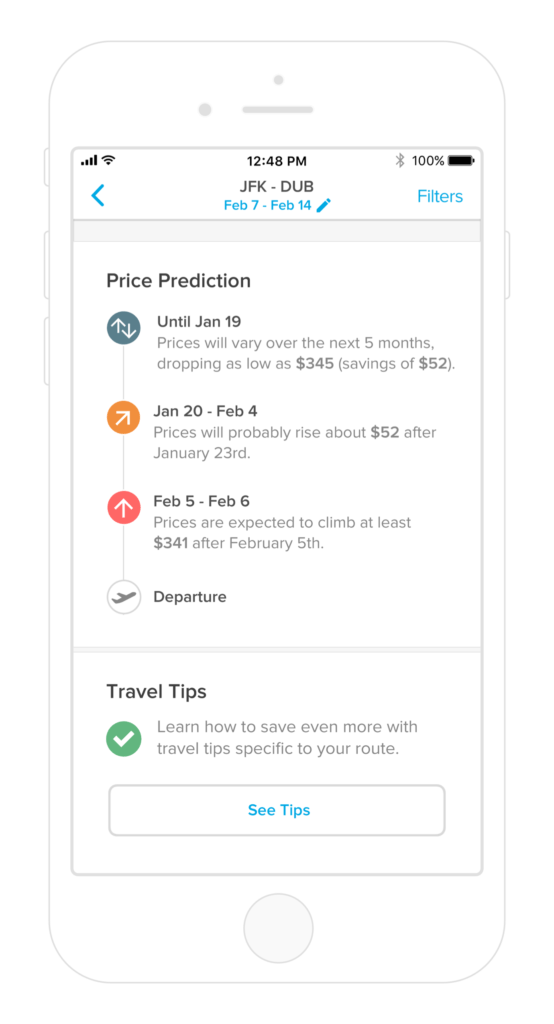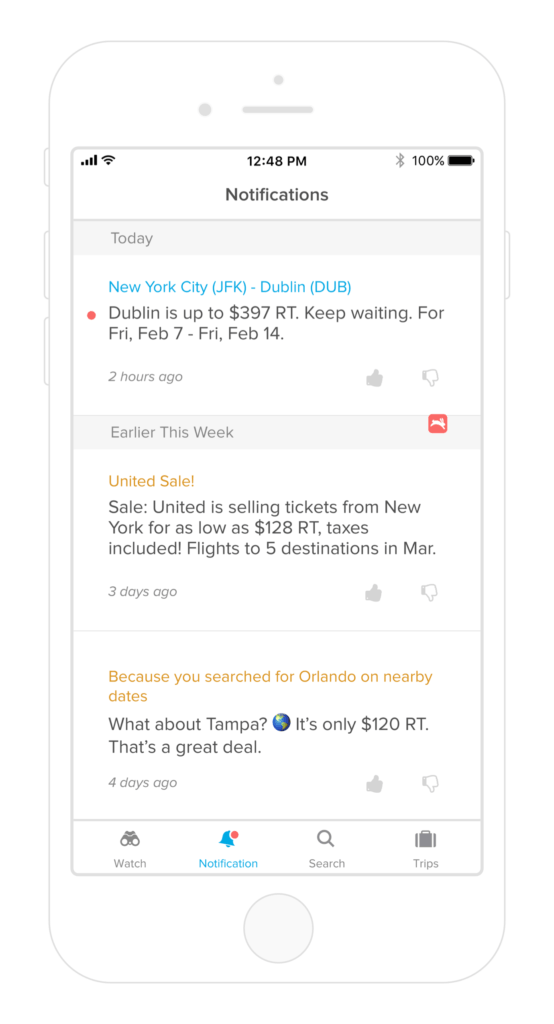Hopper: Using AI to Plan Your Next Vacation

Hopper's proprietary algorithms and data allows the company to increase engagement with customers and predict customer intent when booking travel.
Using AI, Cambridge-based OTA Hopper predicts flight and hotel prices and offers its users personalized recommendations about the optimal booking time, as well as alternative travel offers. Since its launch in 2015, the app has sold more than $600 million worth of flights and is currently selling about $1.5 million every day. Prior to launch, Hopper invested six years and over $10 million dollars to improve their prediction algorithms. In 2018, the startup raised another $100 million in funding, money that it plans to use to build out its AI algorithms and expand deeper into international markets.
There are a number of popular travel applications and websites that help people search for and book trips, from established technology companies like Expedia and Booking.com to start-ups such as Hipmunk, Lola Travel, and Freebird. Hopper has established a distinctive position by making recommendations for when consumers should make travel purchases and helping customers discover new trips outside of their search criteria.
As an AI-driven and data-driven company, Hopper hopes to take advantage of proprietary algorithms and data that it has collected to increase engagement with customers and predict customer intent.
Demand Forecasting:
One of the key features that Hopper currently offers is to make predictions about future flight prices. The company also makes recommendations about whether users tracking a flight should “buy now” or “wait for a better price”. To do so, the company has created the largest flight database in the world. This includes trillions of historic prices from the past decade, as well as an active feed of about 300 billion prices a month. For example, the cost of a particular flight from Boston to Beijing roundtrip might be stored as a price. In addition, the company collects a variety of different measures to help make predictions about future prices. These include jet fuel prices and growth in capacity. Furthermore, Hopper has built up a data feed about the volume of demand across travel agencies, OTAs, and metasearch sites to examine what people are searching for and asking for. This creates a leading indicator that helps Hopper forecast how airlines will adjust their rates. Rather than just creating a matrix of prices between different travel locations, the combination of historical data, demand data, and other measures creates a powerful prediction engine. This has allowed the company to predict airfare prices with 95% accuracy up to one year in advance.
 Source: https://media.hopper.com/press-kit
Source: https://media.hopper.com/press-kit
User Intent Prediction:
Hopper is a mobile-only application that functions as an OTA. In comparison to a metasearch provider or aggregator, the company makes money via commissions on flight booking. Rather than passing the customer to another site, the booking takes place right in the app. This enables Hopper to 1) regularly engage with users about travel opportunities and 2) gather end-to-end user data.
As a mobile-only application, Hopper is able to regularly engage in conversations with users via push notifications. Fred Lalonde, the CEO of the company talks about how this leads to a difference in experience. “At Expedia when I was there, if we saw you twice a year we were happy.” Rather than a customer visiting a travel website with a specific travel date and location in mind, users come back to the app on average every four to five days. Hopper customers will frequently revisit the application to get the best travel deals and get inspiration for other travel.
Furthermore, the trips that are planned on Hopper serve as proprietary data that helps the company predict what people will buy even though they have not asked for it. Hopper learns more about its users by building lookalike profiles of anonymized data of people who have similar preferences to you. “It’s similar to how Netflix will recommend a show to you based on what other viewers like you are watching,” Lalonde said. “What once was done by a human travel agent is now done through a machine that gets smarter each time an action is (or is not) taken.”
Today, about 25% of Hopper sales comes from a ticket that the person did not ask for. When the push notification comes from AI, meaning it is making a suggestion that was not explicitly requested by the user – the conversion is almost three times higher than when Hopper talks to you about the thing you asked for. Hopper is working to enhance its algorithm to predict user intent. The eventual flow is that a user will provide Hopper with some general intent about where they want to go – it can be an entire country, without even entering specific dates. The user just need to express what they need and Hopper will start a conversation with the customers to find relevant travel itineraries.
 Source: https://media.hopper.com/press-kit
Source: https://media.hopper.com/press-kit
Future:
Hopper provides price forecasting and making predictions about user intent. While it has focused on airline travel, they may be well-positioned to expand into other types of travel and lodging. For example, a user’s air travel query is highly correlated with the type of lodging they will purchase. The company will need to make additional investments to learn customer preferences and provide personalized recommendations about additional services or upgrades.
In January 2019, the Lufthansa Group has entered into a research alliance with Hopper focused on the subject of artificial intelligence in airline revenue management. In addition to this research partnership, the Lufthansa Innovation Hub is supporting Hopper’s expansion to Europe in 2019.
Going forward, one of the key challenges of the company will be to provide relevant recommendations and predictions to keep their app users engaged and to keep their conversion rates high.
Sources:
https://www.phocuswire.com/AI-series-part-3-Hopper
https://www.builtinboston.com/2018/12/27/spotlight-working-at-hopper-engineering-data
https://lifehacker.com/hoppers-new-price-freeze-feature-will-let-you-save-low-1840015595
https://media.hopper.com/research/consumer-airfare-index-may-2019-guide-to-summer-travel



Fascinating. What a powerful prediction engine! Predicting airfare prices with 95% accuracy up to one year in advance, and 3x higher conversion rates for AI recs are both staggering achievements. I would love to learn more about their models. I guess their competition would as well, haha. I see they are based in Cambridge, did this company grow out of one of the universities, or was it founded by former students?
One of the most interesting parts of the article was wen you mentioned that 25% of Hopper sales comes from a ticket that the person did not ask for. I’m also surprised by the frequency with which users end up visiting the site – in the digital world user engagement is key, and this is certainly on the right track. My only concern is that this model can be replicated. As the large aggregators like Kayak and Expedia grow, the better data they’ll have. While Hopper may have built some stickiness with its customer, I wonder if they’ll be able to withstand copy cats coming into the market. Regardless, it seems that the business is headed in the right direction!
This is a great article – thank you! My immediate thought was: why am I not using this application?! On a more serious note, I am really impressed by their predictive power – being able to predict prices a year in advance is a big achievement. My question is regarding the future direction that the company will go in: maybe predicting inventory needs of various goods companies could be an application of the powerful technology they own?
I agree with your point that it will be key to improve the algorithm’s ability to predict user intent at a level more closely matched with its level of accuracy at predicting prices. Having users input their intent is one way, but, despite the data security/creepiness factor, might there be a way for Hopper to predict this based on other digital breadcrumbs? A specific use case that comes to mind is being invited to a wedding or another event requiring travel – once there’s a digital trail suggesting that I may go on this trip, an ideal OTA to me would be able to see that on my calendar and start pushing me notifications on when to buy.
Great article! I am also really impressed by some of the performance stats that you mentioned. The level of engagement, in particular… it’s incredible that Hopper has its users visiting the application every four to five days. It makes me think that Hopper benefits from some of the inherent anxiety around securing a good airline price. They seem to have made price monitoring satisfying, exciting and even addicting. It’s a powerful service and I think they have a lot of opportunity to expand their offering.
You write that the company is able to predict airfare prices with 95% accuracy up to one year in advance. What really drives the use case for the customer is how much money can be saved by employing the technology, and, in this regard, I am a little skeptical. I wonder if there are that many price reductions over a reasonable time frame that a higher accuracy in forecasting prices really translates into relevant savings. For example, I always book as soon as I know that I need to travel and all dates are confirmed since prices only become more expensive when coming closer to the travel dates. However, the recommendation engine seem to be really interesting as it allows Hopper to optimize capacity utilization since customers can be motivated to travel on dates or to locations for which still spare capacity exists. This is also a very valuable value proposition for any hotel, cruise line, travel agency, etc.
Hey Tommy thanks for sharing this. I plan to travel a lot next year, and will download Hopper to my phone now I guess 🙂
I do see that they have a very strong CVP, and am confident that they’d be able to attract a good number of users who are price sensitive and always try to secure the best deals possible. At the same time, I also think there’s so much potential for them to penetrate into other travel-related areas, such as lodging as you mentioned. Plus they can also make the platform more social-oriented by creating an in-App community of like-minded travelers, matching them using big data for purposes such as group travels, hotel booking etc. Given all the opportunities they can explore down the road, I believe that Hopper could be a very attractive acquisition target for larger platforms such as the big OTAs.
Very interesting article. In reading this, I was wondering how this business intends to compete with Google flight. Specifically, I wonder whether google has access to more data and customer intent information (related searches etc), to be a more natural proactive ticket suggestion engine.